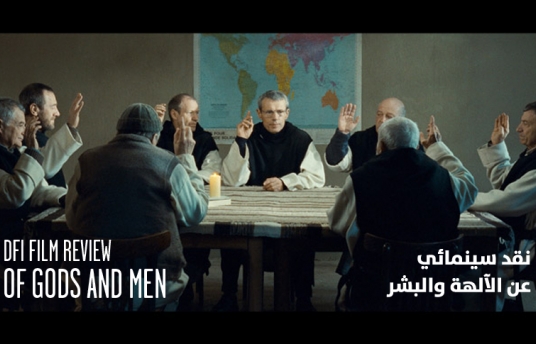DFI Film Review: Of Gods and Men (2010)
Jul 31, 2011

Written by Reem Saleh, New Media, DFI
Title: Des hommes et des dieux (Of Gods and Men)
Year: 2010
Director: Xavier Beauvois
Stars: Lambert Wilson, Michael Lonsdale, and Olivier Rabourdin
Genre: Drama, History
Based on true events, ‘Des hommes et des dieux’ (Of Gods and Men) tells the story of nine French Christian monks in a monastery of an impoverished Algerian village. Fear rises as Islamic fundamentalists are killing innocent people, and the monks’ lives are being threatened. The monks who were perfectly coexisting with their Muslim brothers are now faced with the dilemma of staying or leaving, which will soon transcend into a spiritual journey.
At first, the film establishes the harmony of the monks with their neighborhood by focusing on their daily routines. This routine of attending weddings, funerals, offering free medical care and whatever their modest existence is capable of. Moving from a Christian mass followed by a Muslim call for prayer highlights the similarities in both religions in a beautiful unison of beliefs.
But this harmony is soon to be disturbed with the succession of unfortunate events that starting with the murder of a young girl in a bus for not wearing the hijab (Islamic veil), followed by the massacre of a group of Croatians working in Algeria. These events leave the whole village – Muslims and monks alike – with an escalating fear of what might be happening next.
Now that everyone is under menace, the Algerian army offers to protect the monastery. But Christian (Lambert Wilson) the elected monk in charge, insists on sharing the same fate of the people in the village, and refuses the army’s guard. This decision leads to friction amongst the remaining priests, raising existential and devotional questions, with some wanting to leave and the others wishing to fulfill their pious duties by staying.
With a rising number of assassinations, and the shadow of death haunting all, the monks finally agree to stay. When the moment comes for a radical decision, they find themselves witnessing their strongest spiritual momentums. Their decision comes with doubts and fears, but mainly with love for the community they were part of for years. In other words, the monks agree to live and die with their Muslim brothers for better or for worse.
The lesson of the film is revealed in this bible quote at the opening scene of the film: “You are Gods, sons of the Most High, but you shall die like men and fall like princes”. These prophetic words transport us into the profound vision of these men, deep into their internal struggles of real faith. It develops in form and content through their daily routines with every prayer that follows in the film. Through the words of their daily mass, we understand their state of mind.
Esthetically, we see the monks praying with their back to the camera in most of the film, but as their faith grows at a later stage, they chant facing the camera in words about enlightenment. A message becomes then clear to us: they are sure of what they want, and are facing the truth.
The nine characters playing the priests are adorable. These old men in the monastery have beautifully expressive faces, like children, highlighting the purest of humankind. They are as pure as the people around them who are fearful and powerless of their uncertain fate, and this leads to a unique bond driven from a superior and unselfish love.
As danger approaches our protagonists, the director introduces more close-ups on their faces with more silences and long moments of waiting. Every second becomes a heavy burden on both the viewers and the characters. The building of suspense towards the inevitable gets heavier and heavier, as we know that it’s only a matter of time before tragedy comes knocking their doors.
All aging between 45 and maybe 80, their physical weakness is dissolved in their strong eyes. At the climax of their faith, they gather like the disciples of the Christ into the last supper, overwhelmed with contentment and accompanied by tears of joy without any internal reservations. The camera moves from face to face, with Tchaikovsky’s ‘Swan Lake’ in the background for a glorious finale.
This winner of the Cannes grand prize of the jury in 2010, is not only the story of those monks; it is the story of brotherhood universal to all. It’s a fundamental moral resolution, set in a historical context and given human dimension. ‘Des hommes et des dieux’ examines the differences between what one preaches, and one really lives.